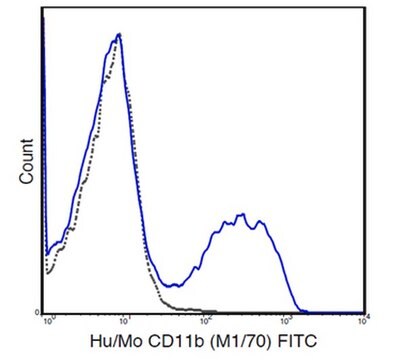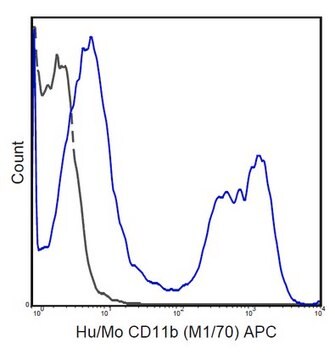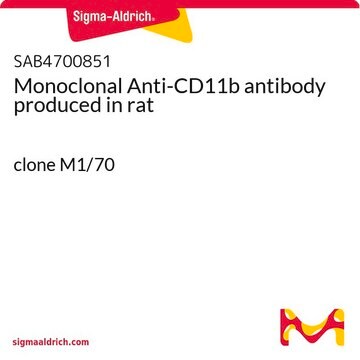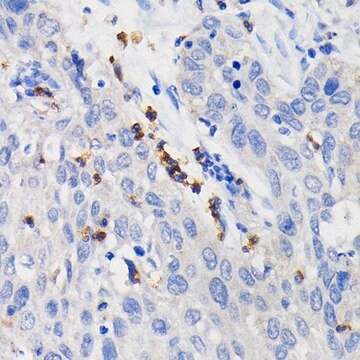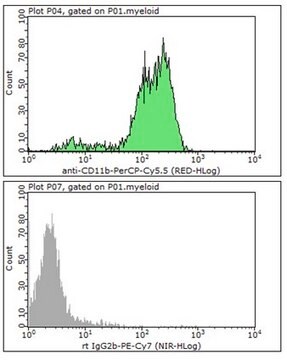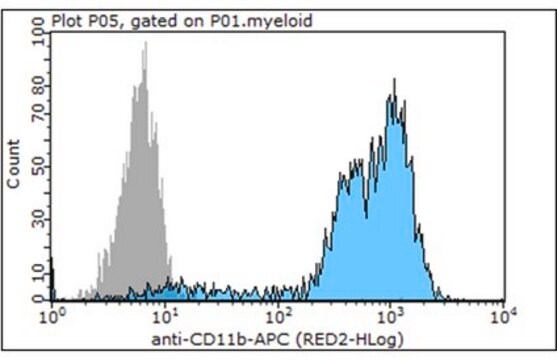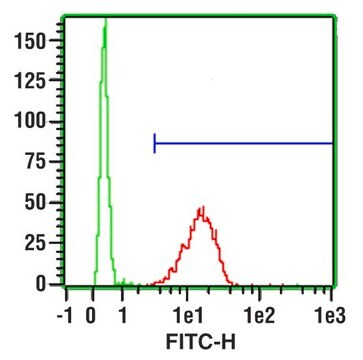SAB4700581
Monoclonal Anti-CD11b, low endotoxin antibody produced in rat
clone M1/70, purified immunoglobulin, buffered aqueous solution
Synonym(s):
Anti-Itgam, Anti-Mac-1 α
Sign Into View Organizational & Contract Pricing
All Photos(1)
About This Item
UNSPSC Code:
12352203
NACRES:
NA.41
Recommended Products
biological source
rat
Quality Level
conjugate
unconjugated
antibody form
purified immunoglobulin
antibody product type
primary antibodies
clone
M1/70, monoclonal
form
buffered aqueous solution
species reactivity
human, nonhuman primates, mouse
concentration
1 mg/mL
technique(s)
flow cytometry: suitable
isotype
IgG2b
NCBI accession no.
UniProt accession no.
shipped in
wet ice
storage temp.
2-8°C
target post-translational modification
unmodified
Gene Information
mouse ... Itgam(16409)
General description
Cluster of differentiation 11b (CD11b), also known as integrin subunit α M (ITGAM), is encoded by the gene mapped to human chromosome 16p11.2. The encoded protein belongs to the integrin α chain family. CD11b is expressed by a variety of myeloid cell types, such as dendritic cells, macrophages, monocytes and neutrophils.
The rat monoclonal antibody M1/70 detects CD11b (integrin alphaM subunit), a type I transmembrane protein mainly expressed on monocytes/macrophages, granulocytes and NK-cells, which associates with CD18 to form Mac-1 integrin that plays important role in cell-cell interactions.
Immunogen
B10 mouse spleen cells enriched for T cells
Application
The reagent is designed for Flow Cytometry analysis. Suggested working dilution for Flow Cytometry is 1 μg/mL of sample. Indicated dilution is recommended starting point for use of this product. Working concentrations should be determined by the investigator.
Biochem/physiol Actions
Cluster of differentiation 11b (CD11b) acts as a receptor for complement component C3 degradation product, iC3b. CD11b interacts with β2 chain (ITGB2) to form a leukocyte integrin (MAC-1 or complement receptor 3 (CR3)), which in turn plays a crucial role in adherence of neutrophils and monocytes to stimulated endothelium. Mutation in the gene increases the risk of susceptibility to systemic lupus erythematosus (SLE) and acute inflammatory demyelinating polyradiculoneuropathy (AIDP).
Features and Benefits
Evaluate our antibodies with complete peace of mind. If the antibody does not perform in your application, we will issue a full credit or replacement antibody. Learn more.
Physical form
Solution in azide free phosphate buffered saline, pH 7.4; 0.2 um filter sterilized. Endotoxin level is less than 10 EU/mg of the protein, as determined by the LAL test.
Disclaimer
Unless otherwise stated in our catalog or other company documentation accompanying the product(s), our products are intended for research use only and are not to be used for any other purpose, which includes but is not limited to, unauthorized commercial uses, in vitro diagnostic uses, ex vivo or in vivo therapeutic uses or any type of consumption or application to humans or animals.
Not finding the right product?
Try our Product Selector Tool.
Storage Class Code
10 - Combustible liquids
Flash Point(F)
Not applicable
Flash Point(C)
Not applicable
Choose from one of the most recent versions:
Already Own This Product?
Find documentation for the products that you have recently purchased in the Document Library.
The pathogenic relevance of αM-integrin in Guillain-Barre syndrome.
Dong C
Acta Neuropathologica, 132, 739-752 (2016)
Association of Systemic Lupus Erythematosus with C8orf13?BLK and ITGAM?ITGAX
Hom G
The New England Journal of Medicine, 358, 900-909 (2008)
A nonsynonymous functional variant in integrin-alpha(M) (encoded by ITGAM) is associated with systemic lupus erythematosus.
Nath SK
Nature Genetics, 40, 152-154 (2008)
J Tan et al.
The Journal of neuroscience : the official journal of the Society for Neuroscience, 20(20), 7587-7594 (2000-10-12)
Reactive microglia have been suggested to play a role in the Alzheimer's disease (AD) process, and previous studies have shown that expression of CD45, a membrane-bound protein-tyrosine phosphatase (PTP), is elevated in microglia in AD brain compared with controls. To
Genome-wide association scan in women with systemic lupus erythematosus identifies susceptibility variants in ITGAM, PXK, KIAA1542 and other loci
Harley JB
Nature Genetics, 40, 204-210 (2008)
Our team of scientists has experience in all areas of research including Life Science, Material Science, Chemical Synthesis, Chromatography, Analytical and many others.
Contact Technical Service